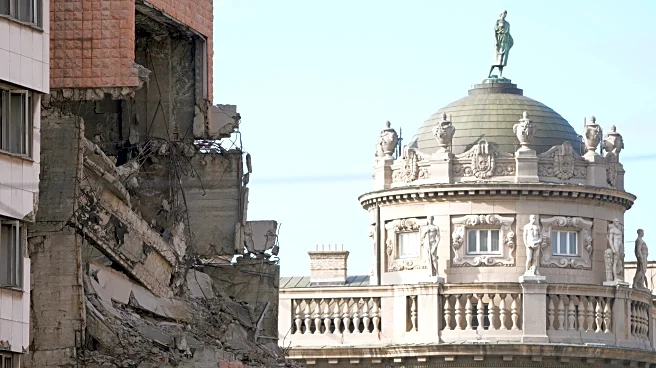BELGRADE, Serbia (AP) — Serbian lawmakers on Friday passed a special law clearing the way for a proposed real estate project that would be financed by an investment company linked to Donald Trump’s son-in-law
Jared Kushner despite widespread public opposition and legal hurdles.
After days of a heated debate and street protests by opponents of the plan to revamp of a landmark former Yugoslav military complex in central Belgrade that was partially destroyed in a NATO bombing campaign in 1999, the bill was approved with a 130-40 vote in the 250-member parliament.
Serbia’s government last year stripped the complex of its protected status and signed a 99-year-lease agreement with Kushner-linked U.S.-based Affinity Global Development. But the project stalled after Serbia’s organized crime prosecutors launched an investigation into whether documents used to remove the protection status were forged.
While pro-Trump populist government of President Aleksandar Vucic says the project would boost both the economy and ties with the current U.S. administration, the plan has met fierce opposition from experts because of the building’s architectural significance — and because it is seen a symbol of resistance to the U.S.-led NATO bombing, widely viewed in the Balkan country an unjust “aggression.”
The special law, known as Lex Specialis in Latin, allows authorities to push forward work on the site, including demolition of what remains of the two sprawling buildings seen as prime examples of mid-20th century architecture in the former Yugoslavia.
The bill does not mention Kushner’s investment company Affinity Partners or details of any future development projects.
“We are demolishing the ruins in order to build,” populist Serbian Progressive Party lawmaker Milenko Jovanov defended the project during the debate.
Critics say the special bill undermines Serbia’s legal system. Corruption watchdog Transparency Serbia has warned it “represents a combination of the two most dangerous forms of corruption – the legalization of law violations and the tailoring of general rules to fit hidden interests in one specific case.”
Vucic has claimed the ongoing judicial investigation was launched based on demands from abroad to "prevent Serbia from establishing better relations with the Trump administration.”
The $500-million luxury compound project would include a high-rise hotel, a luxury apartment complex, office spaces and shops. Authorities say Kushner’s company has committed to building a memorial complex within the site, dedicated to all victims of the NATO bombing campaign.
As the debate started earlier this week, hundreds of protesters rallied outside the Serbian parliament building with banners reading: “Culture is not for sale, we will not give up the general staff" building.
Opposition lawmaker Aleksandar Jovanovic described the law as a “crime” that would replace a heritage site with “casinos and Jacuzzis.”
Serbia was bombed in 1999 for 78 days to force then President Slobodan Milosevic to end his crackdown on separatist ethnic Albanians in Kosovo. Anti-NATO sentiments in Serbia remain strong to this day and many feel the U.S. role in revamping the army headquarters is particularly sensitive.
In the past year, Vucic has faced youth-led protests shaking grip on power in Serbia. Protesters have accused his government of rampant corruption in state projects. The protests started after a concrete canopy collapsed at a train station in the northern city of Novi Sad after renovation, killing 16 people.
Tens of thousands of people on Nov. 1 marked the tragedy's anniversar y in the city of Novi Sad.
Earlier this year, the government in Albania, another Balkan country, approved the Kushner's company a $1.6 billion plan for investment off its Adriatic coast that envisages turning a communist-era fortified island into a luxury resort.









